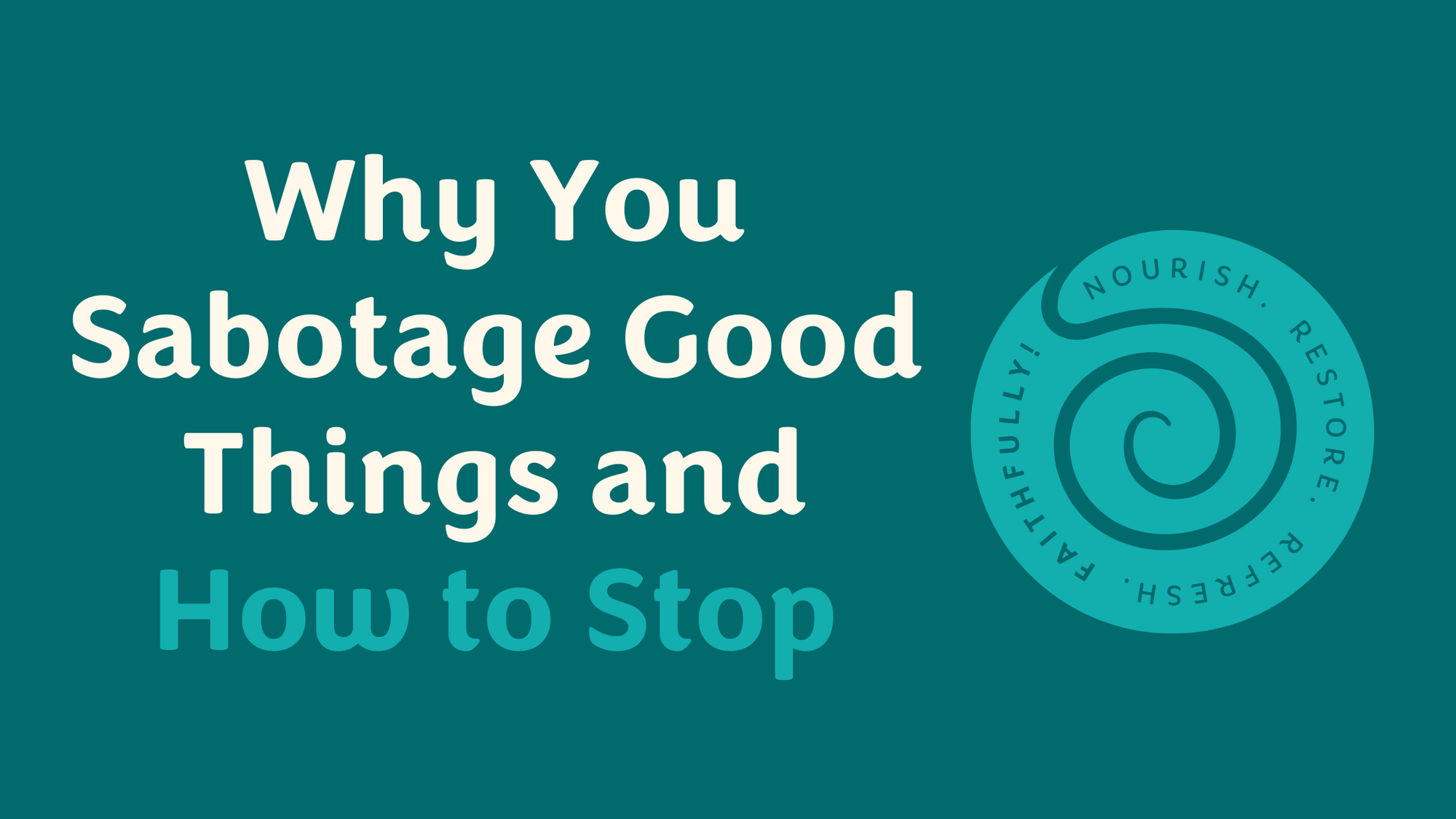Have you ever found yourself in a season where things are finally going well… and instead of leaning in, you pull back?
You stop replying to the texts.
You ghost the person who really liked you.
You procrastinate on the opportunity you prayed for.
You create conflict in a space where peace was growing.
And then, afterward, you’re left wondering:
“Why did I do that?”
This pattern has a name. It’s called self-sabotage and if you’ve ever fallen into this cycle, you are not alone.
In this blog, we’re digging into why we sometimes sabotage the very things we want most, what fear of success and self-punishment have to do with it, and how you can finally stop shrinking from the good that’s trying to meet you.
What Is Self-Sabotage?
At its core, self-sabotage is when your actions work against your own goals or desires.
You might:
-
Procrastinate when you're close to completing something meaningful
-
Pick fights in relationships that were going well
-
Turn down opportunities because you feel like you’re “not ready”
-
Overthink, over-apologize, or overcomplicate
-
Set goals and then avoid them once they’re in reach
It’s frustrating because often, we know we’re doing it.
But awareness doesn’t always stop the pattern because the root usually runs deeper than logic.
Self-sabotage isn’t just bad behavior. It’s often a coping mechanism rooted in fear, shame, or trauma.
Why Do We Sabotage Good Things?
Let’s unpack the psychology behind it. Most self-sabotaging behavior stems from two major roots:
1. Fear of Success
This might sound strange at first because why would anyone fear success?
But success changes things. And change, even good change, can be terrifying.
You might fear:
-
More responsibility or pressure
-
Losing the comfort of being overlooked
-
Outgrowing the people around you
-
Being “seen” and not living up to expectations
-
That you’ll fail publicly after succeeding privately
So rather than risk the fallout, you stall your own growth.
Fear of success often comes from early conditioning. Maybe you were taught that shining too brightly made others uncomfortable. Maybe the few times you did succeed, you felt isolated or unsupported. Maybe no one ever modeled what healthy success looked like, so now it feels unsafe.
2. Self-Punishment
Self-sabotage is often tied to a belief that we don’t deserve good things.
We feel unworthy of the love, the opportunity, the breakthrough, so we subconsciously block it.
This can stem from:
-
Childhood trauma
-
Repeated rejection
-
Religious or cultural guilt
-
Internalized shame
Instead of receiving good things, we punish ourselves with chaos, delay, or unnecessary struggle because a part of us still believes that ease equals laziness or that we must earn joy through suffering.
Perfect Example: The Dream Job You Don’t Apply For
You came across a job posting. It’s perfect. You’re more than qualified.
You’ve dreamed about a role like this.
But instead of applying, you scroll past it telling yourself:
“I probably won’t get it anyway.”
“They’re probably looking for someone better.”
“What if I get it and mess up?”
You sabotage yourself before anyone else has a chance to reject you.
Why? Because rejection hurts, but hope can also hurt too. Hoping for something and not getting it feels vulnerable. So instead, you preemptively shut it down.
But the truth is that rejecting yourself first doesn’t protect you. It just ensures you miss out.
What Self-Sabotage Might Sound Like:
“I don’t want to get my hopes up.”
“It’s too good to be true.”
“I always mess things up eventually.”
“I’ll wait until I’m more confident/qualified/put-together.”
“If I succeed, people will expect more from me.”
“They probably didn’t mean that compliment.”
Do any of these sound familiar?
These aren’t just throwaway thoughts. They’re agreements you’ve made with fear and the good news is, you can break them.
How to Break the Pattern of Self-Sabotage
1. Name the Pattern Without Shame
You can’t heal what you don’t name.
Start by gently acknowledging where sabotage is showing up. Ask yourself:
-
What areas of my life do I shrink in when things are going well?
-
What stories do I tell myself when success or goodness starts to grow?
-
Do I believe I’m worthy of good things without struggling for them?
Awareness is the first step to change, not as a way to beat yourself up, but to move forward with compassion.
2. Challenge the Underlying Belief
Most sabotage is rooted in limiting beliefs:
-
“I’m not ready.”
-
“Success will isolate me.”
-
“If I fail, I’ll lose everything.”
-
“I have to earn love by performing perfectly.”
When those thoughts come up, don’t just accept them, challenge them.
Try this:
“I feel like I’m not readyn but I’ve prepared for this. I don’t need to be perfect to be qualified.”
“Success doesn’t have to isolate me. The right people will support me as I grow.”
3. Rewire What You Believe About Success
Start telling yourself a new truth:
“Success doesn’t change my worth, it reflects my growth.”
“It’s safe for me to be seen.”
“I can succeed and still be loved, supported, and grounded.”
“Good things can come to me without punishment.”
Affirmations won’t fix everything but they will start to shift your mindset. And that shift matters more than you think.
4. Take One Small Step Toward the Thing You Want
Sabotage often thrives in inactivity.
The antidote? Intentional, imperfect action.
Don’t try to fix everything at once. Just ask yourself:
What’s one small thing I can do today to align with my next level?
Maybe it’s sending that email.
Maybe it’s updating your resume.
Maybe it’s texting someone back.
Maybe it’s choosing to speak kindly to yourself.
Even the smallest step creates momentum and momentum kills sabotage.
5. Let Yourself Receive Without Earning
One of the hardest things for self-sabotagers is simply this:
Receiving.
Without working for it. Without struggling. Without punishing yourself first.
You don’t have to bleed to be worthy.
You don’t have to prove your value to deserve good love.
You don’t have to run yourself into the ground before you rest.
Ease is not weakness.
Joy is not indulgent.
Success is not selfish.
Sometimes, the bravest thing you can do is accept what’s good and stop fighting it.
Faith Perspective: You Were Made for More
Let’s be clear: God didn’t put you here to constantly sabotage your own becoming.
You are not “too broken.” You are not “too late.” You are not “too much.”
You were made for impact.
But impact can’t happen if you’re hiding behind self-punishment.
Purpose can’t flourish if you’re constantly choking it out with fear.
God’s blessings don’t require your perfection. They require your willingness.
So show up. Even scared. Even unsure. Even shaking.
You were never meant to settle for barely getting by.
You were made to thrive and yes, that can feel scary.
But fear doesn't disqualify you. It just reminds you that you’re stepping into something bigger.
You’re Allowed to Grow Without Shrinking First
You don’t have to destroy what’s good before it disappoints you.
You don’t have to quit before someone notices you’re growing.
You don’t have to sabotage to stay safe.
You are safe now.
And you’re worthy now.
So the next time you feel yourself pulling away from the very thing you asked for, pause.
Breathe.
Remind yourself: It’s safe to receive good things. It’s safe to win. It’s safe to rise.
What You Can Do Today:
Reflect: Where do I tend to sabotage what I prayed for?
Write: What do I believe I have to “do” to be worthy of success or love?
Act: Take one small step toward the good thing (not away from it).
Affirm: “It is safe for me to receive good things without punishment.”
Share: Talk to someone safe about the pattern. Healing happens in community.
You don’t have to keep hitting the self-destruct button when things go right.
Let this be the season where you stop running from good and start rooting in it.
You were built to carry the blessing.
You were born to break the cycle.
And every time you choose growth over fear, you’re teaching your soul a new way to live.
Keep the faith. Bet on you. God already did. 💚






















Comment
That was a wonderful blog. I know that I do tend to self-sabotage, and it is something I need to work on.